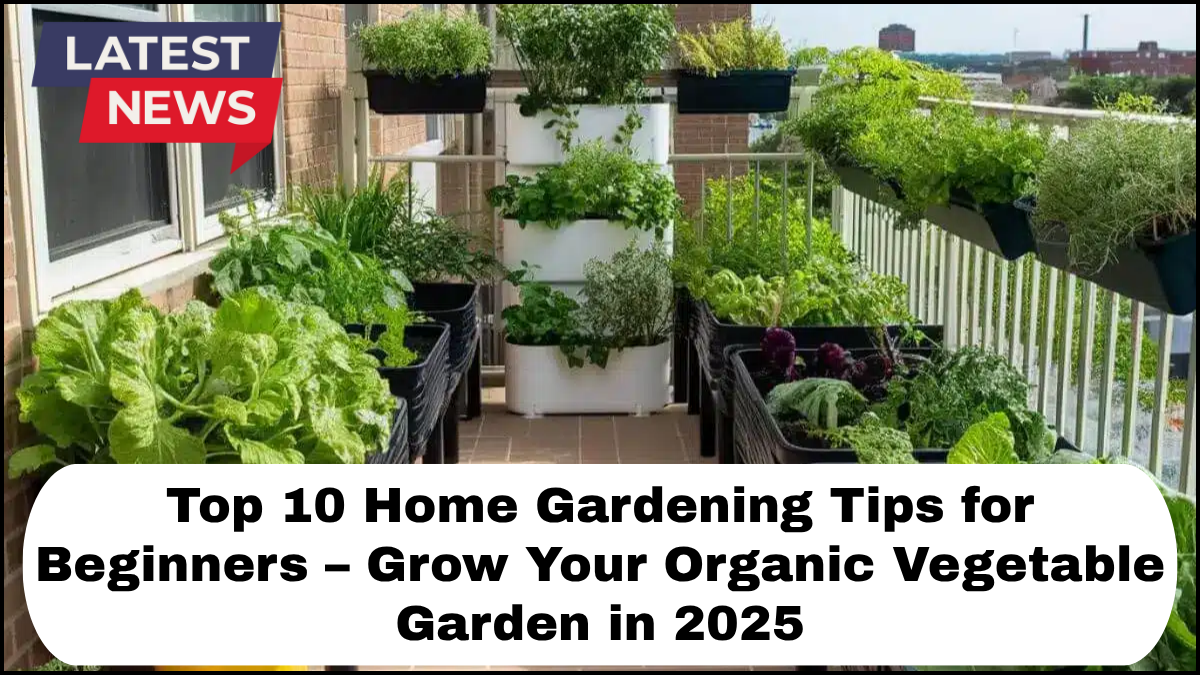Thinking of starting your own organic vegetable garden at home in 2025? You’re not alone. With more people turning to sustainable living and home-grown food, gardening is becoming a practical and rewarding hobby. Whether you have a spacious backyard or just a balcony, these top 10 home gardening tips for beginners will help you grow fresh, organic produce with ease and confidence.

1. Start Small, Think Smart
Don’t overwhelm yourself with a massive plot from day one. Begin with a few easy-to-grow vegetables like tomatoes, lettuce, spinach, and radishes. Container gardening is ideal for beginners and urban dwellers with limited space. It lets you learn the basics while minimizing the risk of costly mistakes.
2. Choose the Right Location
Sunlight is non-negotiable. Most vegetables need at least 6–8 hours of direct sunlight per day. Identify the sunniest spot in your yard or balcony and plan your garden around it. Poor lighting leads to stunted growth, fewer fruits, and more pest problems.
3. Know Your Soil (Or Create It)
Healthy soil is the foundation of any thriving organic vegetable garden. Test your soil’s pH and nutrient levels using an at-home kit. Ideally, your soil should be loamy, well-draining, and rich in organic matter. Mix in compost or well-rotted manure to boost fertility. If your natural soil is poor, consider raised beds or containers with high-quality organic potting mix.
4. Select Organic Seeds or Seedlings
Stick to certified organic seeds or seedlings to ensure your vegetables are free from synthetic chemicals right from the start. Look for reputable suppliers, and choose varieties suited to your region’s climate. Heirloom and open-pollinated varieties are great for flavor and seed saving.
5. Practice Companion Planting
This ancient gardening technique involves planting different crops near each other to enhance growth, repel pests, and maximize space. For instance, basil improves the flavor of tomatoes and helps deter insects. Marigolds can keep nematodes and aphids away. Companion planting builds biodiversity and reduces dependency on pesticides.
6. Master Watering Techniques
Overwatering is one of the most common beginner mistakes. Your vegetables need consistent, deep watering—especially during flowering and fruiting. Water early in the morning to prevent disease and reduce evaporation. Drip irrigation or soaker hoses are efficient, especially in larger gardens.
7. Embrace Composting
Turn your kitchen and garden waste into black gold. Composting reduces waste and enriches your soil with vital nutrients and beneficial microbes. Keep a small compost bin for scraps like vegetable peels, coffee grounds, and eggshells. Avoid meat and dairy, which can attract pests.
8. Stay Organic with Pest Control
Ditch synthetic pesticides and go natural. Neem oil, garlic spray, and insecticidal soaps are great organic options. Introduce beneficial insects like ladybugs and lacewings to control aphids naturally. Regularly inspect your plants for pests or disease and act quickly to prevent spread.
9. Keep a Gardening Journal
Document what you plant, when you water, how your crops perform, and any problems you face. This helps track patterns, refine your methods, and make informed decisions each season. A journal becomes an invaluable tool over time as you grow into a more experienced gardener.
10. Be Patient and Learn Continuously
Gardening is a journey, not a race. Every garden season teaches you something new—whether it’s timing, spacing, or dealing with pests. Read books, watch tutorials, join local gardening groups, or attend workshops. Don’t fear failure; even seasoned gardeners make mistakes.
Final Thoughts
These home gardening tips are your foundation for cultivating a successful and thriving organic vegetable garden in 2025. Start with simple steps, use natural methods, and grow with confidence. Your future self—and your dinner plate—will thank you.
Frequently Asked Questions (FAQs)
Q1: What are the easiest vegetables to grow for beginners?
A: Some beginner-friendly options include lettuce, radishes, green beans, cherry tomatoes, and zucchini. They grow quickly and require minimal care.
Q2: How often should I water my organic vegetable garden?
A: Most vegetables need about 1 inch of water per week, including rainfall. Adjust based on temperature, soil type, and plant needs.
Q3: Can I grow vegetables indoors?
A: Yes, herbs and leafy greens like spinach or lettuce grow well indoors with sufficient light. Use grow lights if natural sunlight is limited.
Q4: What is the best time to start gardening?
A: Spring is ideal for most regions. However, some vegetables like kale or carrots can be planted in the fall. Always check your local planting calendar.
Q5: How do I keep pests out of my garden naturally?
A: Use companion planting, introduce beneficial insects, and apply organic pest control sprays like neem oil or garlic spray. Regular monitoring is key.
click here to learn more